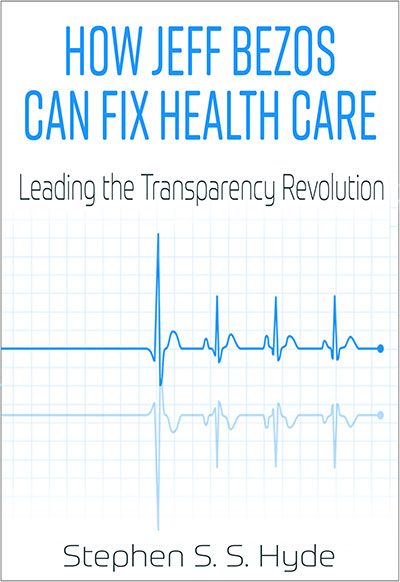Is there anyone in this country who doesn’t know the American health care system is a broken, dysfunctional, unaffordable, impossible-to-navigate, deteriorating mess? I don’t think so.
Who, then, knows how to fix it? The government? Doctors and hospitals? How about academics? Or employers? What about insurers and pharmacy benefit managers? Ok, bad joke there. After five decades working in every major sector of health care, from financing to delivery to regulation—I can state categorically that none of them know how to do it.
How about the patients themselves? Do they know the solution? Sorry, no, although, as with Justice Stewart’s famous definition of pornography, they will definitely know it when they see it. They are why I’ve written How Jeff Bezos Can Fix Health Care: Leading the Transparency Revolution, to explain how America’s employers—without any government action—can give their 160-million employees and dependents the power to force medical costs to drop by half while doubling medical quality across the entire country.
The Problem. Here’s the fundamental problem. Over the past 60 years, America’s medical consumers’ have been disenfranchised by a paternalistic system of government and employer bureaucracies that decide:
What insurance you can have and how much you have to pay for it.
What medical care and prescription drugs you’re allowed to have.
Who you have to get it from.
When you’re allowed to get it.
How much you have to pay for it.
We consumers have lost authority over the single factor that has made the customer king in every other segment of our economy—control of the money. As a result, two massive financial sinkholes have formed that deny us an affordable health care system:
- Huge, secret price variations. A growing majority of working families now pay all of their annual health care costs from their own pockets because of growing insurance deductibles. Yet we are denied access to the price and quality information that would allow us to find the best providers at the lowest price. That’s why a Denver patient with a high-deductible health plan can be forced to pay the entire $8,280 bill for an abdominal CT scan, never knowing she could have obtained an identical one for $290 at another imaging center. If patients could shop by price, medical costs would drop by a third or more.
- Massively wasteful transaction costs. On top of high unknowable prices sits an outmoded payment system that leeches out more than a sixth of all medical spending—adding no patient value whatever. Meanwhile, everything else we buy—food, clothes, school supplies, transportation, housing, and recreation—involves a mere 1-2% debit/credit card transaction fee.
Government failure. To date, every major attempt to reduce out-of-control medical spending has come directly or indirectly from the federal government. Every one has failed, as will every future such top-down, paternalistic, bureaucratic effort.
Private sector opportunity. Completely lost in the debate is the fact that America’s major private-sector employers have long had all the tools they need to fix this broken health care system. They just haven’t done it. It’s time for that to change. How Jeff Bezos Can Fix Health Care explains in detail what must be done, who must do it, and why it hasn’t yet happened. It prescribes a fundamental, utterly practicable breakthrough for a private-sector, consumer-market-driven solution to high costs and uncertain quality.
Who should read this book? This is an essential book for anyone wanting a sustainable, affordable, high-quality health care system. This includes concerned consumers, private employer executives and managers, doctors & health professionals, hospital clinical and management professionals, educators in business and health policy, economists, and managerial finance specialists. It is a must-read for all the CEOs who have for too long ignored the power they possess to offer affordable, high-quality health care to their workforce and their families.
This book is both a workable prescription and an essential text for anyone wanting to understand how to make health care affordable and sustainable. It explains how our seemingly incomprehensible, deeply dysfunctional, and massively wasteful system is really quite understandable and eminently fixable.
In other words, it’s a dangerous book.

